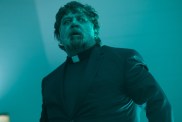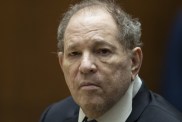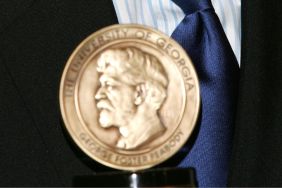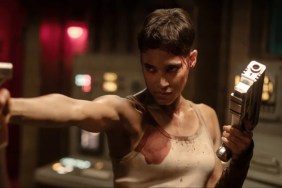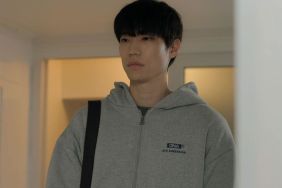It’s been over ten years since British filmmaker Roger Spottiswoode took on the James Bond franchise with Tomorrow Never Dies, but instead of continuing his inroads into Hollywood blockbusters, Spottiswoode chose to take a different career route. In recent years, the writer of Eddie Murphy’s early action-comedy 48 Hours has taken on more socially-conscious historical dramas about important men who made a difference during times of turbulence and war. A few years ago, he made Shake Hands with the Devil, which dealt with one such man during the Rwandan genocide, and now with The Children of Huang Shi (watch exclusive clips), he takes a unique look at the invasion of China by the Japanese in the late ’30s.
The epic film stars Jonathan Rhys Meyers (“The Tudors,” Match Point) as George Hogg, a British journalist abroad who witnessed first-hand the horrifying treatment of the Chinese people by the invading Japanese army in Nanjing. After narrowly escaping with his life, he was recruited to run an orphanage full of young survivors of the atrocities, a job he took on whole-heartedly, to the point where he led the boys across the mountains of China for months in search of a safe haven. To this date, he’s still one of the most revered Westerners in that part of China for the selfless sacrifices he made to save dozens of children.
It’s an amazing film co-starring Radha Mitchell, Chow Yun-Fat and Michelle Yeoh in which Spottiswoode and Meyers immersed themselves within the Chinese film community to bring added realism to Hogg’s amazing story. Earlier this week, ComingSoon.net had a chance to sit down with Roger Spottiswoode to talk about this intriguing wartime drama.
ComingSoon.net: Was this a script you found or was this a subject you wanted to turn into a movie that you shepherded from the beginning?
Roger Spottiswoode: Two producers found it, Clive and Davina, they found it about ten years ago and they came to me I guess after about a year and then we worked on it together with writers for three or four years. Then we found we couldn’t get it on for some reason, and we decided that one of us would by the other out and I bought them out. Then I continued trying to find different ways to finance it and brought in other producers. My friend Weiland Schulz-Keil, he figured out that we could maybe make it as a Chinese-Australian co-production, but the Chinese only have a co-production treaty with Canada–I’m Canadian but that didn’t work out–but they’re negotiating one with the Australians, so with that co-production treaty between those two countries, we were able to access money in China, money in Australia, and then he added a German element. The British turned out to be no good because Gordon Brown is busy rewriting everything for the tax people… or wrecking the film industry I’m afraid. It took a long time to do it, but this co-production treaty is not finished, so it had to be a memorandum of understanding. The legalities and the complexities of this kind of film. It’s not a studio film that was financed in America that shoots on some location. This is an independent film that we made as a Chinese-Australian film.
CS: You can tell, because so much of the cast and crew are made up of both Chinese and Westerners.
Spottiswoode: But almost all Chinese. There’s three Westerners I think who really had any influence and the rest were all Chinese: a Chinese DP, Chinese and an Australian production designer, but the Chinese found all the locations, the sound, wardrobe, so it’s very much a Chinese film. I wanted it to be, because it’s a film about someone who goes to China and immerses himself in China and I wanted it to be a film that’s got more Chinese than Western. I didn’t want to just shoot in locations; I wanted it to feel like you were in China.
CS: Was it writer James MacManus who originally found the story of George Hogg?
Spottiswoode: Yeah, he stumbled into it. He was working for the Guardian and was in Beijing looking for a subject and as he puts it, he overheard some other Western journalists complaining that they had to go to Shandam where the Chinese were unveiling the only statue they had ever created to an Englishman or a European, this guy George Hogg, about whom he knew nothing–the world knew nothing–and he wrote an article, he started researching and then wrote a script a few years later and then even later, just recently, wrote a book, and it’s been published.
CS: So that will be out around the same time as the movie?
Spottiswoode: No, it hasn’t come out here yet. If the film does well, it would come out, but otherwise, it came out in England because it’s an English subject, but Harper-Collins didn’t know there was an audience for it.
CS: Did you know about the “Nanking” documentary which came out last year?
Spottiswoode: Didn’t see it but I knew about it.

CS: That was a story few Westerners really knew about, with those atrocities going on that no one really knew about it because China remained closed-off due to Communism. Was that the same case with George Hogg’s story?
Spottiswoode: Even the English didn’t know about it. He wrote for the Guardian, but he didn’t write a lot because this life took over, so there wasn’t a huge written record of his life. James and Jane Hawksley worked it all out but Hogg wasn’t a well-known person in England. It’s a very small isolated story. It doesn’t mean it’s less good, it’s just that the world didn’t know about him, and he’s an interesting man. MacManus and we found him before all these children died, which is extraordinary. Forty of them are still alive.
CS: Once you read his script, did you want to do your own research into his life? You obviously found some of those survivors.
Spottiswoode: Wasn’t time. We found what we could, but so much of our story has had to be condensed. There’s far more to his life. You have to take out bits and simplifying and try to tell it in a way that will make sense without knowing all the other bits and pieces. I did a film two years ago about Rwanda, and it’s really about one person, the General in charge of the United Nations in Rwanda. It takes place over 200 days, but even that, putting 200 days into 2 hours is incredibly complicated and you lose…
CS: But didn’t you interview all the survivors yourself?
Spottiswoode: No, just some of them. I sent someone out to film them. I met some of these people and I just talked to them. I didn’t film them, then I had a preview in Boston, and some people at the end said, “It feels like a true story and it would be amazing if it was a true story.” And I said, “Excuse me, but how many people noticed the front titles says, ‘Based on a true story’?” and a third of them had read that and the others hadn’t, and the bit on screen for a long time, so extended it even more at the front and I called my assistant who was back in China and said that I had to do something else and that I needed interviews, like we had, and I wanted to put them on the end titles, so at the end, people can know, so I changed the end titles at the last minute when I discovered that people were not reading the front titles.
CS: So those interviews were after the fact. I thought maybe you did those as part of your research into George’s story.
Spottiswoode: No. I mean I did interviews but I didn’t record them. I just wanted to find out and talk to people and then realized only after the fact that people didn’t really understand it, and I said, “If we recorded those interviews.”
CS: That’s not too surprising though because when I first saw that “Nanking” movie, I didn’t believe it either because those stories of what happened in China is never really taught in history books here.
Spottiswoode: The woman who committed suicide, Iris Chang, that’s a remarkable book, “The Rape of Nanjing.” (sic)
CS: And there are other movies being made out of that, too. So let’s talk about casting Jonathan, because you had to get someone who had to learn Chinese and Japanese and work with kids.
Spottiswoode: Yes, and he was very good at it. We got a lot of enthusiasm and passion and I saw him in “Bend It Like Beckham” and “Match Point” and I thought he had an interesting variety, very dark and yet had this other energy, and I thought he’d be great for Hogg and he loved it, so it worked out really well. He threw himself into it, loves to work, keeps himself out of trouble when he’s working usually, and he had a very good time.
CS: Did he have any questions or concerns about playing this character? Presumably, he wasn’t familiar with him beforehand…
Spottiswoode: Yeah, we talked to him and he learned a bit about him. He had lots of questions and found out about him, and he was exactly the same age, and they both had a youthful vitality and appetite for life and he saw how well that would work.
CS: You’ve been to China yourself, so did you feel a similar type thing as George might have in terms of the culture.
Spottiswoode: Well, he’s much better at languages than I am because he spent longer there, and he learned a lot more and he immersed himself. I stayed in hotels and I was on the outside trying to do a lot, while he went into small towns and then into this orphanage and he was just there and that became his life. I didn’t do nearly as well at immersing myself but I thought the film should be immersed in China.

CS: What about getting Jon together with the kids? I assume these were all Chinese kids and did any of them speak English at all?
Spottiswoode: Two I think. Guang Li who grew up in Australia and there’s one other, who says “Dog,” he’s Chinese but he spent a few years in Canada.
CS: What was that like for you and Jon to work with all these Chinese kids who didn’t speak English, especially with such a dramatic and serious story?
Spottiswoode: Well, they all read the script or had it read to them, and I had a translator who talked to them a great deal, and it’s amazing how much we do depend with children on communicating with our eyes and our energies. Even if they worked with the same language, they would not have the same meaning for the language. They were much younger, so a lot of communication is non-verbal. You may be talking but they don’t get all the meaning from the talking. Your energy and what you’re asking and showing them what to do. It’s complicated but fun. You sit with the kids and explain things, and they look at your hands and how loud you’re speaking. It’s not just the meaning of the words, it’s what you’re showing them.
CS: I could see this being very educational for the younger kids, as I’m guessing they might not even know the stories about George Hogg. Did the young actors get a chance to meet any of the survivors who they were representing?
Spottiswoode: Yeah, they had dinner with some of them. We took the four brothers out and there were others around, but they particularly liked those four because we had children playing them and we ended up having an evening together at the end.
CS: I enjoyed seeing Michelle Yeoh in this as well, because I think most Americans first heard of her because you put her in “Tomorrow Never Dies” which did a lot for her career here.
Spottiswoode: Yeah, she’s great. When I was doing the Bond film, my two nephews said to me, “Do you get to choose the Bond girl?” and I said, “Yeah, I’m going to have a say in it” and they said, “Well, there’s this great woman, completely different from all the usual ones, in Hong Kong who does these movies. You should see her.” Only in a Bond movie, can you go in and say to the producers, “Look, there’s this terrific woman, I’d love to go see her, do you think that’s okay?” and they’ll say, “We’ll get on it immediately” And she’s great, she’s absolutely fearless.
CS: It was a fairly small role, so did she just come in for a few days?
Spottiswoode: Yeah, well she did it as a favor, but she’s terrific in it.
CS: What about working with some of the Chinese crews? You have Zhang Yimou’s cinematographer who does amazing work. How hard was it to mesh the two worlds, bringing your background into the Asian way of making films? I know you shot some of the Bond movie in Vietnam, right?
Spottiswoode: I did, I did and I worked there for “Air America” and I’ve been in the Philippines for something else and I had shot in Japan. As you know, we all make films in sort of the same way. I particularly wanted the film to be more Chinese so I didn’t want to shoot it like I shoot things. I wanted to have a dialogue with the DP and I wanted to become more Chinese, so I move the camera a bit more than he does, and he’s more static than I am, so we moved into this other area. We found some place in between. It became something else, but it became something more Chinese.
We had one day in Australia and everything else was mainland China. We had a Hong Kong A.D. who was bilingual, and the rest was mainland. We shot in the Gobi Desert and all the places where the story took place. We weren’t in Shandan, we were near Shandan. Shandan is such an ugly modern city now. It’s all gone. Nanjing you can’t shoot in because there’s only a few old buildings and they’re on such a busy road. You can’t shoot in old Nanjing. It doesn’t exist, it’s gone. You have to create it, but we were in Shanghai and we were in a place called Hankyeng and were up in the Lanchau Mountains, which Hogg walked through at 10,000 feet, so we were in those places. We were in the Gobi Desert near Shandan, so we followed closely to his route.
CS: What were some of the other challenges of making the movie? You obviously had a lot of big set pieces, a couple war scenes, but it was independently-financed, so how did you make some of those scenes happen?
Spottiswoode: The money goes a very long way in China, so that’s very helpful, and they’re very good at some things. They do have casts of thousands and they have amazing wardrobe departments. We said, “Well, there’s going to be 2,000 people here,” and they said, “No, that’s not a problem.” And they do it working the most amazing hours. They had big crews, but they also worked incredibly hard. We worked double and triple shifts, and in the desert, on our first day, we sank all our (vehicles). There was a detour posted that wasn’t there before and we were sent off into the Gobi Desert on our way to the first location, and 50 trucks and buses sank through the desert crust, and at 4 in the morning, the entire crew gets out and we start gathering stones and little pebbles and for hours, they worked away and we built a road out of stones. Digging our vehicles out and put a road of pebbles and drove our vehicles out, took hours to do, and nobody complained, nobody said a word. Nobody asked for a tea break or a coffee break. We lost half a day of shooting, we caught it up, but nobody ever said a word about it, and that’s how they do it.

CS: Going back to the Asian-Western collaboration, you have David Hirschfeld doing the score and he mixed styles in a very interesting way with Western orchestral music combined with traditional Asian instruments. Had he written any Chinese music before?
Spottiswoode: I don’t think he’d done Chinese, but he did that Rwandan film while we were doing this. He loves doing that, but there aren’t any Chinese players in Australia, but he did a lot of score for “Shine” and he did the original “Elizabeth.” It was one of those occasions where I could hire him at the very beginning during pre-production, four or five months before shooting, so he was playing with ideas before we started shooting and then when we started shooting, I would send cut footage by the editor every day and he was sending it to David. It was the only time I’ve ever done this. He saw every cut; he scored every cut. He knew it was all being thrown away, but he was playing with ideas and the score really grew with the film.
CS: A few other filmmakers I’ve spoken with have worked with composers even before they start shooting and it’s an interesting way to approach film music.
Spottiswoode: Yeah, it’s so much better than if they come in at the last minute and they have to do it very fast, and bang, it’s right or wrong, because he’d try ideas out and throw them away. He’d play them on his synthesizer and I’d listen and we’d talk about it, so the score developed. It’s a beautiful score, it’s lovely.
CS: Between this and “Shake Hands with the Devil,” you’ve done a number of historical films, so what are your feelings on taking artistic license with true stories in order to make a better film or tell a better story? It’s always a tough balance, I’m sure.
Spottiswoode: It varies. This, because it’s not about historical accuracy, it’s not politics, and it’s about a person, I felt like it should be true to the person, but I knew I had to condense dates and times and put people together, so I took a reasonable amount of liberties. With Rwanda, we made nothing up. There’s a couple places where two people are combined into one, but almost every location is the real location. Almost everything is exactly right. It’s French and English, and we tried to go as far as we know very accurate. It’s been run endlessly for people who were there, and it’s been double-checked, not just by Dallaire so it’s very accurate even though it leaves a lot out of course, but nobody says that it’s not what really happened. It was at the Toronto Film Festival, it was at Cannes, but it hasn’t been sold here. There’s a documentary with the same name that’s come out here, but this is a docudrama where Roy Dupuis plays Dallaire, looks extremely like him, and Dallaire saw it for the first time and said he forgot after five minutes who it was. He just watched this man, watched Dallaire, and he’s very like him.
CS: You used to write comedies and direct action movies but you’ve been leaning more towards these socially-conscious films. Was that something very deliberate you wanted to do or move towards?
Spottiswoode: They’re just more interesting and what I choose to make, but they just take a lot of development, they take a lot of time and the big films occasionally pay one’s rent and pay for the options on these things. Eight years of development, and you spend an enormous amount of your own money. There’s no studio paying for all of this, so developing scripts and getting them up to the time where they’re financed is a long, expensive business, and I’ve been fortunate but I earn a living on big films that help pay for this.
CS: But these are important stories that people should know about.
Spottiswoode: Yeah, and interesting and compelling and I like to make them, but they just take a long time to nurture and get out. The next one is I believe a William Golding novel, “The Spire,” which I’ve had for ten years now.
CS: Do you think you’ll start shooting that soon?
Spottiswoode: No, but in about a year I think or nine months. I think we’re almost ready.
CS: Do you always tend to have three or four projects in various stages of development?
Spottiswoode: Yeah, well you do. I don’t have a lot more after this and someone else just made one of them. I have a script about a woman in South Africa, and somebody else… I knew there was a completed script and they’ve got theirs going ahead before mine. That’s one of the risks.
CS: Do you see yourself returning to studio films at this point?
Spottiswoode: Well, you know, I would, but I’m more interested in doing my own things and I focus more on finding and doing projects that I’ve wanted to make for some time.
The Children of Huang Shi opens in New York and Los Angeles on Friday, May 23.
